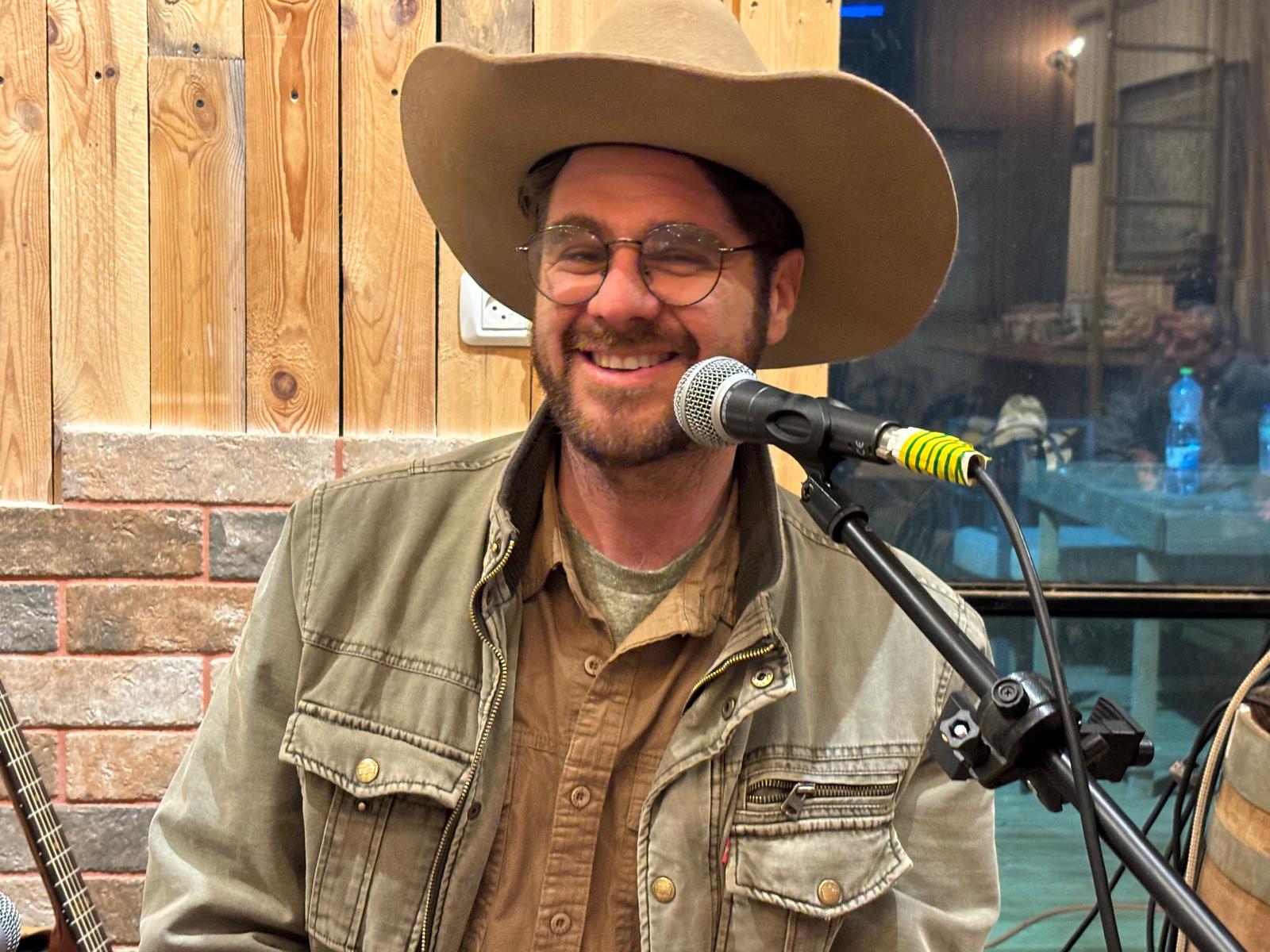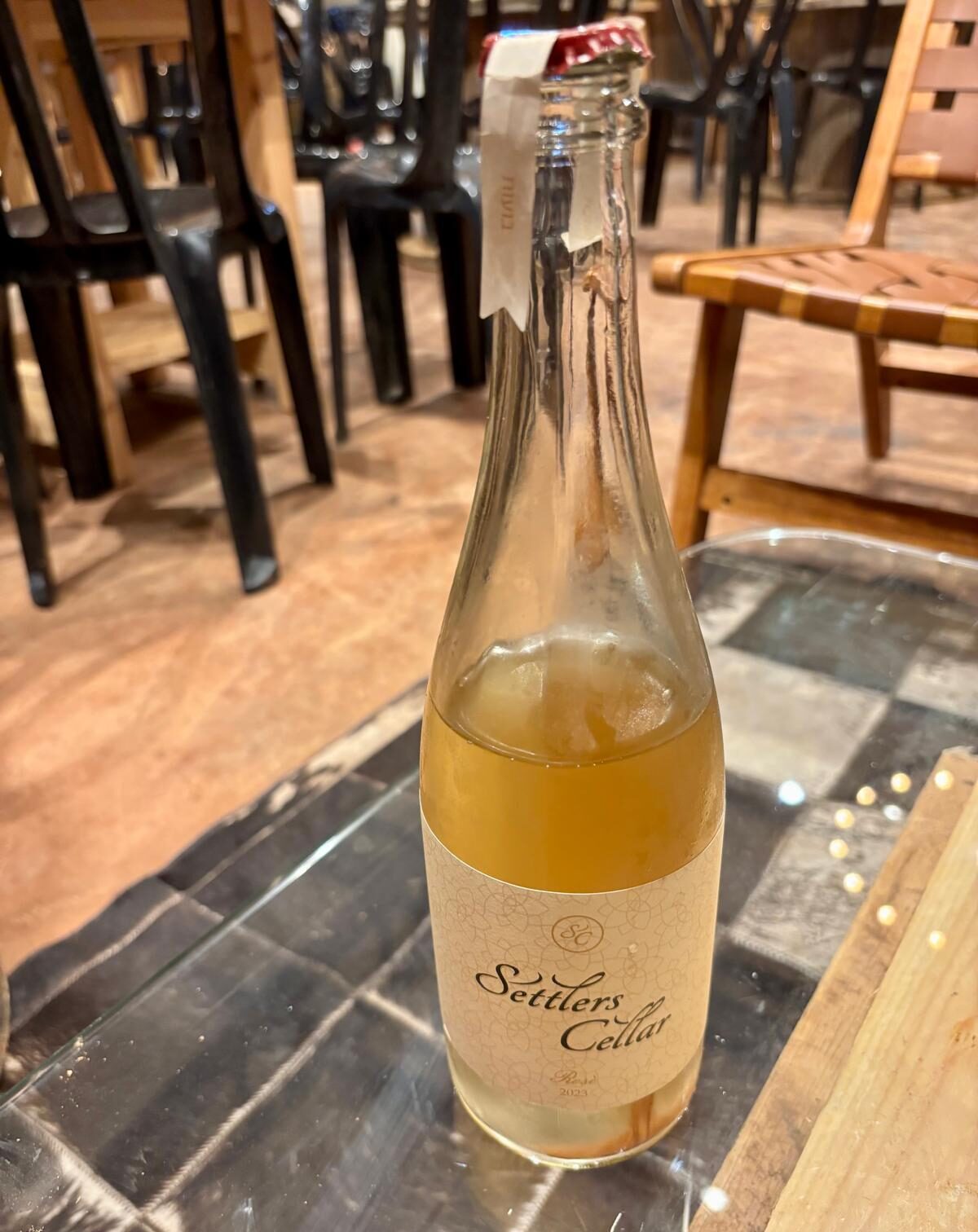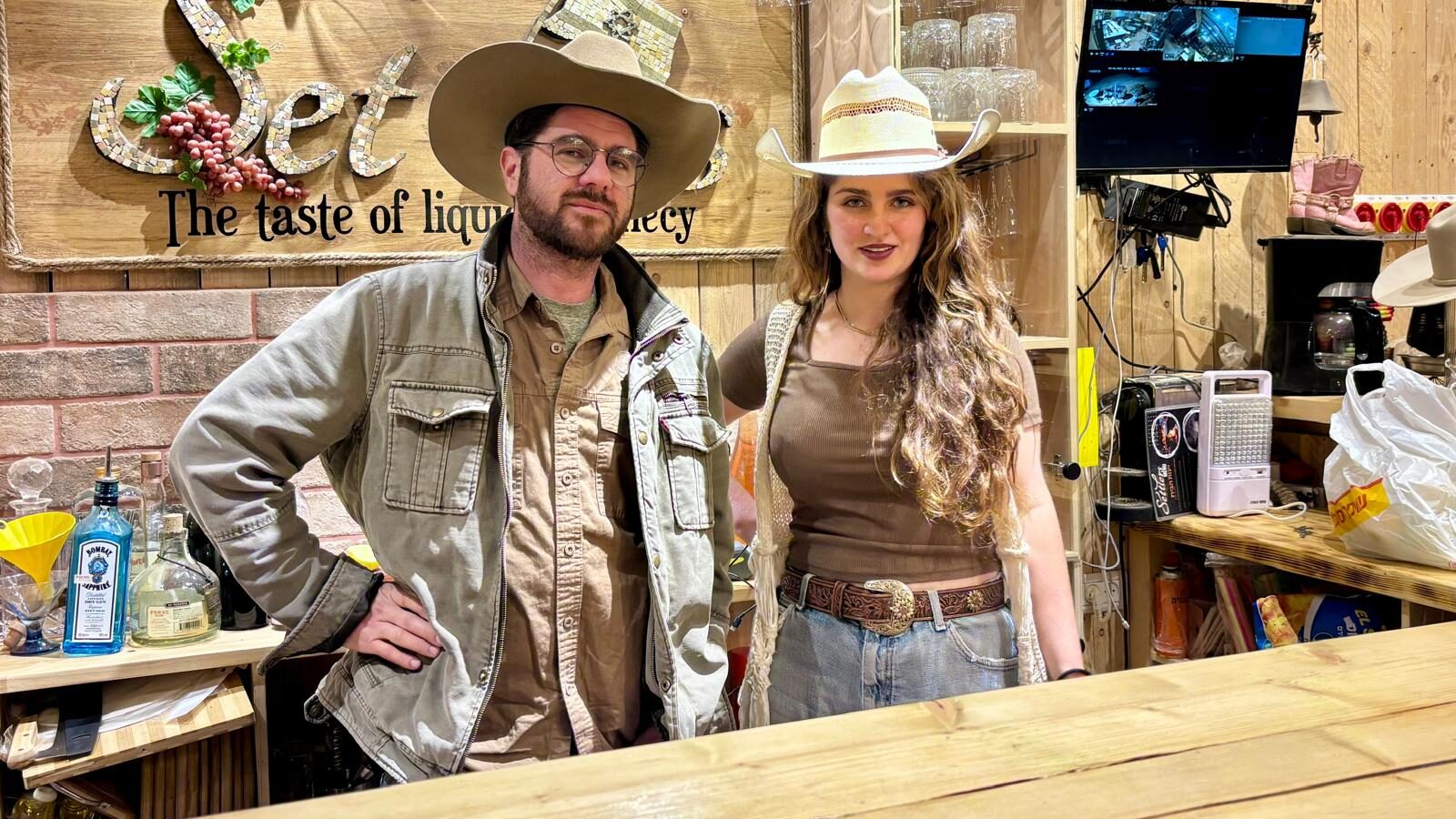Liquid Prophecy: Father-Daughter Duo Crafts ‘Biblical’ Wine
A boutique winery and lodge in a remote settlement is creating a vibrant gathering space despite political and logistical challenges
The winding Samaria roads leading to Esh Kodesh are dizzying—both breathtakingly beautiful and steep, making the drive awe-inspiring and a little intimidating. But once you reach the top of the hill, located 35 kilometers from Jerusalem and home to only a few dozen families, the view is nothing short of spectacular.
From this vantage point, you can see the Mediterranean Sea to the west and the Jordan River Valley to the east.
Nestled in the heart of this small community is a charming wooden cabin that looks like something out of Little House on the Prairie, complete with a slanted roof and large windows. In the frigid cold of winter, the windows fog up; inside, it’s toasty and inviting.
Settlers Winery & Lodge opened just two months ago, and it has already become one of, if not the, most happening spots in the Binyamin region on Thursday and Saturday nights. Hundreds of locals and visitors from across the country come to drink wine, enjoy good food, and jam to live music until dawn.
The lodge is the brainchild of A.Y. Katsof, a 40-year-old resident of Esh Kodesh.
Katsof, who has lived in the community for 15 years, essentially built his house with his own two hands. In 2011, he planted his first rows of grapes, inspired by a vision to make wine in the hills of Samaria, just as described in Jeremiah 31:5: “Again you will plant vineyards on the hills of Samaria; the farmers will plant them and enjoy their fruit.”
In 2017, he bottled his first label, Settlers Cellar. Since then, the boutique winery has been producing thousands of bottles annually, primarily sold through a private wine club. The wine is also available at the bar—but you won’t find it in stores.
Katsof’s then-7-year-old daughter, Neomi, planted those first grapes alongside him. Now 19, Neomi is running the bar with her father, managing a two-cabin bed-and-breakfast, and helping with the winery.
With her blond hair, feisty attitude, and cowboy boots, she strides through the restaurant with visible pride in what she and her father are building together—although much of the past year, Katsof was away serving in the reserves.

Neomi Katsof at the Settlers Cellar bar in Esh Kodesh, in the West Bank. (Maayan Hoffman/The Media Line)
Around 9 p.m., the bar begins to fill, starting with a small group of soldiers, followed by young women, likely from a nearby seminary. By midnight, it’s packed.
The lights are dim, and as guests grow livelier, the music becomes more eclectic—country, rap, rock, Israeli melodies, even meditative tunes. Instruments like darbukas, guitars, and a small keyboard come out for an open mic session that feels like karaoke but is far more spontaneous and soulful.
“People come from all over Israel: Jerusalem, Tel Aviv, Raanana, Gedera,” Katsof told The Media Line. “We often talk about normalization with Arab countries. This wine bar is normalization among ourselves, among Israelis.”
Katsof explained that people connect through the music, which he calls “jams.”
“Around 12:30 a.m., the music really gets going,” Katsof says as he picks up a guitar to play a soft rock song. His mellow voice fills the room as he sings some of the greatest hits of the ’70s and ’80s.
“Random people get up, bring instruments—country, blues, reggae,” Katsof continued. “People play guitar solos until the sun rises. Some fall asleep on the couch. Others sleep in their cars.”

A.Y. Katsof sings at the Settlers Cellar winery in Esh Kodesh, in the West Bank. (Maayan Hoffman/The Media Line)
The menu varies, reflecting the challenges of living in a remote location where food isn’t always easily accessible and you have to be planful.
Esh Kodesh is fairly isolated, with the nearest community, Shiloh, about 15 minutes away. There’s a small market in Esh Kodesh with limited hours, and a slightly larger one in Shiloh. For major shopping trips, residents drive to Ariel, 19 kilometers away.
On this particular Thursday night, the menu features kosher cheeseburgers—made with kosher meat and vegan cheese—along with fries and pickles. There are also mini schnitzel bites – fried chicken patties. They discover they forgot the lettuce, so just go with the flow.
“It’s hard work,” Neomi told The Media Line.
Give the gift of hope
We practice what we preach:
accurate, fearless journalism. But we can't do it alone.
- On the ground in Gaza, Syria, Israel, Egypt, Pakistan, and more
- Our program trained more than 100 journalists
- Calling out fake news and reporting real facts
- On the ground in Gaza, Syria, Israel, Egypt, Pakistan, and more
- Our program trained more than 100 journalists
- Calling out fake news and reporting real facts
Join us.
Support The Media Line. Save democracy.


She recalled planting grapes for the first time as a child, waking up early to help her father before heading to school.
“It wasn’t like a walk in the park,” she admitted, rolling her eyes slightly. “But at the end of the day, I definitely enjoyed the work, and I still do. We’ve planted a lot.”
Working with family, Neomi acknowledged, can “be very hard.” After spending several months working on a farm, she returned to Esh Kodesh to help her father.
“It’s a lot of responsibility,” she said, “but I think the hard work is good for me. I love being busy. If there’s nothing to do, I go crazy.”
Her feistiness is evident in her big, round eyes. Her long blond hair falls below her waist, and her cowboy boots make sharp clicks on the wooden bar floor as she sets down ketchup bottles and tea light candles in glass holders to brighten the tables.
Since starting to work at the winery, Neomi said she has developed a deep appreciation for wine.
As her father serves samples of their varieties, she often weighs in on her favorites. With practiced ease, she flips out glasses and pours just enough to give a taste, careful not to waste what her father calls “liquid prophecy”—wine sourced from the land of the Bible, fulfilling the verse in Jeremiah.
Not everyone supports what Katsof is doing.
While Jews have a historic connection to the land, dating back to biblical times as Katsof described, Israel lost control of this territory thousands of years ago. After the 1967 Six-Day War, Israel defeated its Arab neighbors, reunified Jerusalem, and gained control of several large areas, including the West Bank. However, aside from the annexations of East Jerusalem and the Golan Heights, Israel never formally annexed the land beyond the Green Line—the armistice line established in 1949. As a result, the status of this territory remains contested, and Israeli settlements in the territory are widely considered illegal by international law.
Esh Kodesh has the added complication of having been built without authorization from the Israeli government and is therefore also considered illegal under Israeli law. It was included in the 1999 “outpost agreement” with Prime Minister Ehud Barak’s government, which evacuated some outposts, moved others, and permitted others to remain in place but did not formally legalize their status.
In 2015, Ariel Handel, a professor at Tel Aviv University, coined the term “wine-washing” in a paper examining the winemaking industry in these disputed areas. A few years later, an opinion writer for Al Jazeera adopted the term, claiming that “Israel is using its wine industry to distract from its other domestic pastimes like ethnic cleansing, apartheid, and the periodic massacre of Palestinians.”
Critics argue that the emphasis on winemaking in the region serves to whitewash its realities. Instead of viewing the occupied territories as a site of checkpoints, clashes, and violence, the focus shifts to portraying them as destinations for fine wine, tourism, and an idyllic quality of life.
For years, Settlers Cellar focused exclusively on producing deep red wines, primarily cabernet sauvignons. However, in recent years, the winery has started experimenting with bubbly rosés and other new creations.
Katsof opens a bottle of their pink wine. It has a bottle cap, similar to a glass soda bottle, and inside is a slightly bubbly elixir. The wine is sweet but not overly so—perfect for a summer day on the beach, a sailing trip across the Mediterranean, or a picnic in the desert, all quintessential Israeli pastimes.
“You go to France, you drink champagne,” Katsof explained. “You go to Spain, you drink cava. If you go to the hilltops of Judea and Samaria, you drink ‘buot.’”

Buot wine, at the Settlers Cellar winery in Esh Kodesh, in the West Bank. (Maayan Hoffman/The Media Line)
“Buot,” which means bubbles in Hebrew, is a sparkling wine that Katsof is developing specifically for the region.
“Every region has its own terroir. Planting grapes in the hills of Samaria is not easy. After 4,000 years, when the Jews returned here, this land was covered in forest,” he said.
The terrain is challenging, with limestone hills that are difficult to farm. The region’s cold mornings, hot days, and cooler evenings create additional hardships for the vines. But Katsof believes these challenges result in stronger, more flavorful grapes. He named the winery “Settlers Cellar” not to evoke the negative connotations associated with the term, but because, as he put it, he and his family came to a deserted hilltop and settled it.
“Settlers are pioneers,” Katsof said.
The early days were not easy. Arab residents would occasionally break into the vineyard and burn the fields.
Each time they destroyed, we planted double
“Each time they destroyed, we planted double,” he recalled.
As a boutique winery, Settlers Cellar can experiment with small batches.
“Sometimes we get lucky, and sometimes we get even luckier,” Katsof admitted with a grin.
Still, he believes they’re only scratching the surface of what they can achieve.
“We are just starting to figure out how to create special, unique flavors,”Katsof said.
Neither Katsof nor his daughter is formally trained in winemaking. They’ve learned on the job, relying on advice from friends in the industry.
For Neomi, like her dad, the work is about more than just making wine—it’s about fulfilling a spiritual mission.
The land was promised to us by God, and it says to plant vineyards in the mountains of Samaria. So that’s what we are here doing.
“My siblings and I are very connected to the Bible and the land. Every Shabbat meal, my father tells us another story about the prophets or the Torah, so we understand. The land was promised to us by God, and it says to plant vineyards in the mountains of Samaria. So that’s what we are here doing,” she explained.
Their work has also inspired Christian believers. Each season, a group of volunteers from the center and southern United States travels to Israel through an organization called HaYovel to help harvest the grapes.
HaYovel, which means The Jubilee, was founded by Tommy Waller, a Missouri resident originally from Tennessee. The organization brings hundreds of people to Israel each year to farm what they call the “biblical heartland.”
“The world is against Israel’s right to live in their biblical homeland,” the group’s website states. “We bring Christians to Israel to serve the land and people, enabling them to connect to the land of their faith, restore Christian-Jewish relations, and confirm Israel’s right to their ancestral homeland.”
Other Christians living in or visiting Israel have also supported Katsof’s efforts, including Henry Strauss, the spouse of Ilse Strauss from the Bridges for Peace organization. Strauss, alongside others, helped build the wine bar, contributing his labor and bringing in like-minded volunteers.
“There is no Arab labor here—only Jewish and Christian labor,” Katsof said. “They are very, very busy, but they volunteer to help us because they believe in helping Jews.”
Katsof has six children, ranging in age from 19 to 8. His 16-year-old son Yisroel often helps out in the kitchen.
Katsof shared a touching story: two soldiers, grieving the recent loss of a close friend who died in Gaza, came to the bar one night to jam. They played their guitars until the early hours of the morning. A few days later, one of the soldiers asked Neomi out on a date, and they’ve been seeing each other ever since.
Nearly every night the bar is open, the young man—whom they refer to only as “N.”—returns to drink, hang out, and enjoy the atmosphere. As the sun rises, Neomi and N. often sit on the stage to play music together. Neomi, who has a beautiful voice, is shy and only sings after her work is done.
Katsof looked at his daughter with a smile. “If they end up together, this whole winery will be worth it just for them.”

